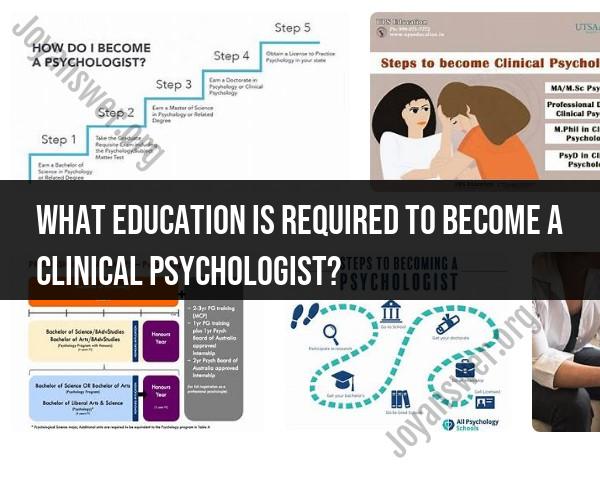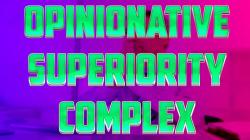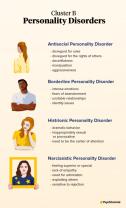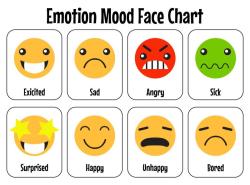What education is required to become a clinical psychologist?
Becoming a clinical psychologist typically requires a significant amount of education and training. Here are the general steps and education requirements to become a clinical psychologist:
Undergraduate Degree: The first step is to complete a bachelor's degree in psychology or a related field. While specific undergraduate majors may vary, it's essential to complete coursework in psychology, including classes in abnormal psychology, developmental psychology, and research methods.
Graduate Degree: Clinical psychologists typically need to earn a graduate degree, such as a Master of Arts (MA) or Master of Science (MS) in clinical psychology or a Doctor of Psychology (PsyD) or Doctor of Philosophy (Ph.D.) in clinical psychology. These graduate programs typically require 2-3 years of full-time study for a master's degree and 4-6 years for a doctoral degree.
Clinical Training: In addition to coursework, aspiring clinical psychologists must complete supervised clinical training or internships as part of their graduate program. These clinical experiences provide hands-on training in assessment, diagnosis, and treatment under the supervision of licensed psychologists.
Licensing: After completing their education and clinical training, individuals must obtain a license to practice as a clinical psychologist. Licensing requirements vary by state and typically include completing a certain number of supervised clinical hours, passing a national or state licensing exam, and meeting other criteria established by the state licensing board.
Optional Specialization: Some clinical psychologists choose to pursue additional training or certification in a specific area of specialization, such as child psychology, neuropsychology, or health psychology. Specialization often involves completing additional coursework, training, or postdoctoral fellowships.
Overall, becoming a clinical psychologist requires a significant investment of time and effort in education, training, and licensure. It's essential to research and carefully consider the specific requirements and opportunities available in your desired area of practice.
Becoming a Clinical Psychologist: The Academic Path
Academic Path: The path to becoming a clinical psychologist typically involves a long and rigorous academic journey with the following steps:
- Undergraduate Degree: Earn a bachelor's degree in psychology or a related field like neuroscience or social work.
- Focus on coursework in psychology, statistics, research methods, biology, and abnormal psychology.
- Gain research experience through internships or volunteer work.
- Master's Degree (Optional): While not always mandatory, some students pursue a master's degree in psychology (usually research-oriented) to gain further research experience and strengthen their application to doctoral programs.
- Doctoral Degree: Earn a doctoral degree in clinical psychology (Psy.D. or Ph.D.). This is the terminal degree required for licensure.
- Doctoral programs typically take 4-7 years and involve coursework, research, clinical practicums, and a dissertation.
- Postdoctoral Internship: Complete a 1-2 year supervised internship program in a clinical setting. This provides practical experience under the supervision of licensed psychologists.
- Licensure Exam: Pass the Examination for Professional Practice in Psychology (EPPP) and any additional state-specific exams to obtain licensure.
- Undergraduate Degree: Earn a bachelor's degree in psychology or a related field like neuroscience or social work.
Required Degrees:
- Undergraduate Degree: While any bachelor's degree is acceptable, a psychology or related field provides the most direct foundation.
- Doctoral Degree: A Psy.D. or Ph.D. in clinical psychology is mandatory for licensure and independent practice.
Certifications and Licensure:
- Certifications: While not strictly required, some psychologists pursue board certifications in specific areas like child psychology or neuropsychology. These demonstrate expertise and can enhance career opportunities.
- Licensure Exams: All states require licensed clinical psychologists to pass the EPPP and potentially additional state-specific exams. Licensure allows independent practice and insurance reimbursement.
Additional Notes:
- The specific coursework, research, and clinical experiences may vary slightly between different programs.
- It is crucial to research and choose accredited programs that meet your interests and career goals.
- Consider your personal strengths and weaknesses when choosing between a Psy.D. and Ph.D. program (Psy.D. emphasizes clinical practice, while Ph.D. may involve more research).
- The entire process from undergraduate studies to licensure can take 8-12 years or more.
Remember, this is a general overview, and specific requirements may vary depending on your location and desired specialization. Researching and contacting relevant programs and professional organizations can provide more in-depth information and guidance.













